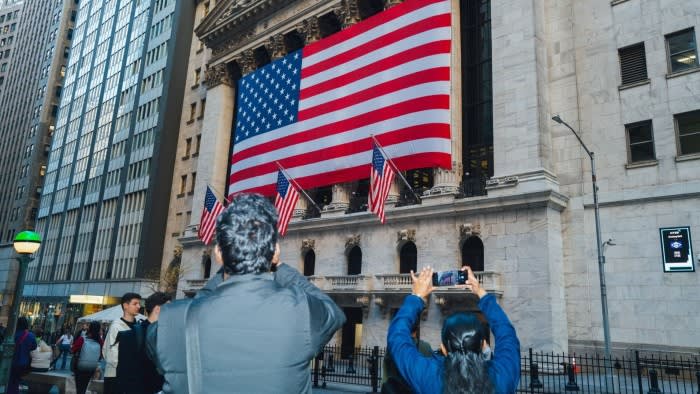Donald Trump’s victory in the US presidential election reverberated across global stock markets on Wednesday, as investors raced to back the winners and sell the expected losers from his win.
Winners
Tesla
Shares in Tesla, whose chief executive Elon Musk became one of Trump’s most vociferous backers, surged as much as 13 per cent in early trading in New York.
The share price change boosted the net worth of Musk, the world’s richest man, by roughly $13bn.
Musk, who contributed more than $100mn to the pro-Republican America Pac, has been promised a role as head of a department of government efficiency in a second Trump administration.
Speaking at his Mar-a-Lago resort in Florida, Trump told supporters that “a star is born . . . Elon” and hailed the Tesla boss as a “super genius”.
Shares in Trump’s Truth Social media company climbed 33 per cent.
Banks
US bank stocks jumped as investors bet that interest rates would stay higher for longer under Trump and his administration would pursue a light-touch approach to regulation.
“This is an inflection point, a real game-changer,” said Mike Mayo, an analyst at Wells Fargo. “If I were to anticipate the mantra of the new administration, it’d be ‘resiliency with efficiency’, not just ‘resiliency at any cost’.”
Banks’ profits were fattened after the Federal Reserve raised interest rates to combat inflation, but that boost has faded as the central bank has started to cut borrowing costs. The KBW Nasdaq Bank Index rose 9 per cent in early trading, reaching its highest level since early 2022.
JPMorgan, Bank of America, and Citigroup were all up about 7 per cent in early trading. Shares in Goldman Sachs and Morgan Stanley advanced by about 10 per cent, helped in part by the prospects that tax cuts would add momentum to a revival in dealmaking.
Manish Kabra, head of US equity strategy at Société Générale, said the prospect of a “red sweep” in which the Republicans took control of the White House and the two houses of Congress would also deliver broader benefits to companies whose fortunes are tied to the US economy.
“Buy US cyclicality: that means regional banks, private equity, private credit, oil stocks and classic reshoring beneficiaries like industrials,” Kabra said.
Private equity
Apollo Global shares led gains for private equity firms, climbing 10 per cent, as investors anticipated they would be winners from any pick-up in dealmaking. KKR was up 7 per cent and Blackstone advanced 3 per cent.
A slowdown in mergers and acquisitions has been a drag on profits for the buyout industry, hitting lucrative performance fees and making it harder for firms to sell their portfolio companies.
Expectations that a Trump administration would introduce a more lenient regulatory regime may also help the industry in its push to sell their funds to individual investors.
Oil and gas companies
Trump courted oil companies during his campaign, vowing to rip up much of President Joe Biden’s environmental and climate agenda and imploring the industry to “drill, baby, drill”.
ExxonMobil, the biggest oil major, and rival Chevron were both up 2.5 per cent despite a stronger dollar hurting the oil prices.
NextDecade, a developer of LNG export terminals, rose nearly 15 per cent. The company’s $18.4bn Rio Grande project has been entangled in a legal morass. EQT, the US’s biggest natural gas producer, gained 8 per cent.
Mortgage groups
Shares in government-backed housing agencies Fannie Mae and Freddie Mac soared more than 20 per cent as investors bet Trump could push for a full privatisation of the two groups that purchase the majority of mortgages issued by banks in the US.
The US government nationalised both agencies as part of their rescue during the 2008 financial crisis. But hedge fund investors, including Bill Ackman of Pershing Square, have bet for years that the government would eventually be forced to end the conservatorship of both Fannie and Freddie due to their revived profitability.
During Trump’s first presidency, his Treasury secretary Steven Mnuchin pushed forward part of the privatisation effort. “He will finish what he started,” said one large Fannie holder.
Losers
Renewables
By contrast, renewable energy companies in Europe slumped amid fears that Trump could abolish the tax breaks and subsidies provided by Biden’s administration.
Denmark’s Ørsted, the world’s largest offshore wind farm developer, weakened 12 per cent while Danish turbine manufacturer Vestas was down 11 per cent.
The S&P Global Clean Energy index, which tracks the world’s largest clean energy companies, was down almost 3 per cent.
Industry executives had been braced for a Trump victory, with Sean McGarvey, president of North America’s Building Trade Unions, telling a conference last week that a Trump victory would be “terrible” for the nascent US offshore wind industry.
Biden’s administration turbocharged offshore wind deployment and set a target of 30GW of offshore wind by 2030. Trump has vowed to stop projects on “day one” of the new administration.
Tariff-exposed sectors
The prospect of Trump imposing new tariffs hit shares of European carmakers. Trump has said he will introduce steep levies on imports, with a plan to impose tariffs for goods from Europe at 20 per cent for Europe and 60 per cent for China.
The broad-based Stoxx 600 autos and parts index fell 2 per cent, with the threat of tariffs on imported cars, including from Mexico and the EU, weighing on German groups such as BMW and Volkswagen, which were down as much as 7 per cent and 5 per cent, respectively.
The world’s biggest shipping companies were also under pressure, with Denmark’s AP Møller-Maersk down almost 8 per cent and Germany’s Hapag-Lloyd off as much as 6 per cent.
The sell-off was being driven by fears that a full-blown trade war between the US and China would reduce demand for shipping, said Petter Haugen, an analyst with ABG Sundal Collier.
Additional reporting by Mari Novik, Sylvia Pfeifer and Rachel Millard in London and Antoine Gara in New York
Source link











